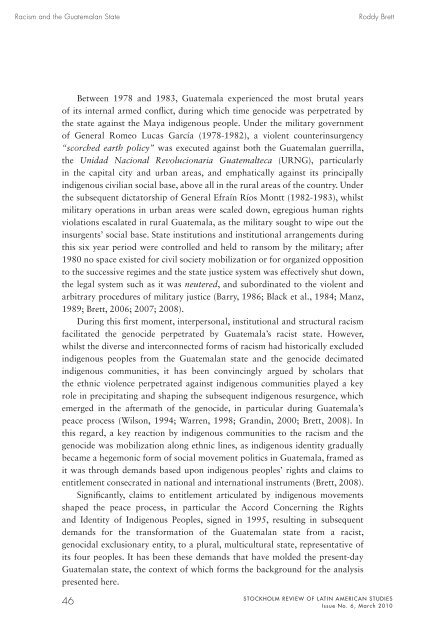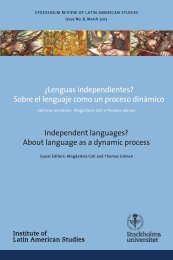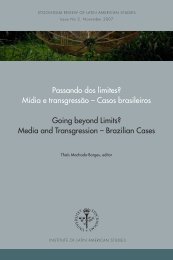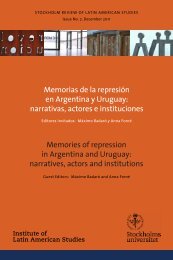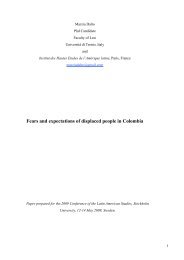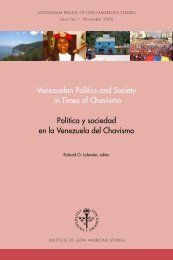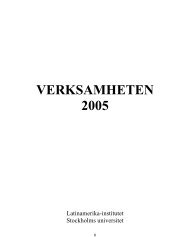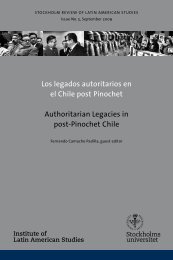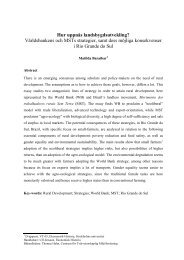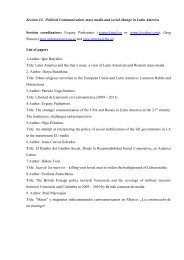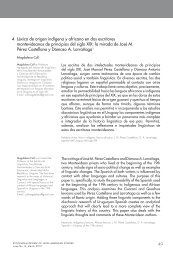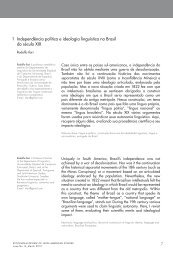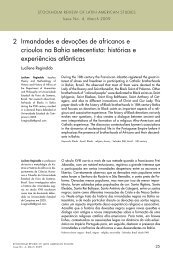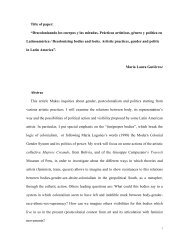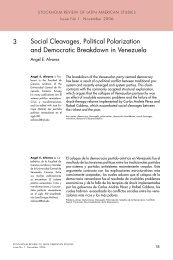Racism and Ethnic Discrimination in Guatemala - Institute of Latin ...
Racism and Ethnic Discrimination in Guatemala - Institute of Latin ...
Racism and Ethnic Discrimination in Guatemala - Institute of Latin ...
- No tags were found...
Create successful ePaper yourself
Turn your PDF publications into a flip-book with our unique Google optimized e-Paper software.
<strong>Racism</strong> <strong>and</strong> the <strong>Guatemala</strong>n StateRoddy BrettBetween 1978 <strong>and</strong> 1983, <strong>Guatemala</strong> experienced the most brutal years<strong>of</strong> its <strong>in</strong>ternal armed conflict, dur<strong>in</strong>g which time genocide was perpetrated bythe state aga<strong>in</strong>st the Maya <strong>in</strong>digenous people. Under the military government<strong>of</strong> General Romeo Lucas García (1978-1982), a violent counter<strong>in</strong>surgency“scorched earth policy” was executed aga<strong>in</strong>st both the <strong>Guatemala</strong>n guerrilla,the Unidad Nacional Revolucionaria Guatemalteca (URNG), particularly<strong>in</strong> the capital city <strong>and</strong> urban areas, <strong>and</strong> emphatically aga<strong>in</strong>st its pr<strong>in</strong>cipally<strong>in</strong>digenous civilian social base, above all <strong>in</strong> the rural areas <strong>of</strong> the country. Underthe subsequent dictatorship <strong>of</strong> General Efraín Ríos Montt (1982-1983), whilstmilitary operations <strong>in</strong> urban areas were scaled down, egregious human rightsviolations escalated <strong>in</strong> rural <strong>Guatemala</strong>, as the military sought to wipe out the<strong>in</strong>surgents’ social base. State <strong>in</strong>stitutions <strong>and</strong> <strong>in</strong>stitutional arrangements dur<strong>in</strong>gthis six year period were controlled <strong>and</strong> held to ransom by the military; after1980 no space existed for civil society mobilization or for organized oppositionto the successive regimes <strong>and</strong> the state justice system was effectively shut down,the legal system such as it was neutered, <strong>and</strong> subord<strong>in</strong>ated to the violent <strong>and</strong>arbitrary procedures <strong>of</strong> military justice (Barry, 1986; Black et al., 1984; Manz,1989; Brett, 2006; 2007; 2008).Dur<strong>in</strong>g this first moment, <strong>in</strong>terpersonal, <strong>in</strong>stitutional <strong>and</strong> structural racismfacilitated the genocide perpetrated by <strong>Guatemala</strong>’s racist state. However,whilst the diverse <strong>and</strong> <strong>in</strong>terconnected forms <strong>of</strong> racism had historically excluded<strong>in</strong>digenous peoples from the <strong>Guatemala</strong>n state <strong>and</strong> the genocide decimated<strong>in</strong>digenous communities, it has been conv<strong>in</strong>c<strong>in</strong>gly argued by scholars thatthe ethnic violence perpetrated aga<strong>in</strong>st <strong>in</strong>digenous communities played a keyrole <strong>in</strong> precipitat<strong>in</strong>g <strong>and</strong> shap<strong>in</strong>g the subsequent <strong>in</strong>digenous resurgence, whichemerged <strong>in</strong> the aftermath <strong>of</strong> the genocide, <strong>in</strong> particular dur<strong>in</strong>g <strong>Guatemala</strong>’speace process (Wilson, 1994; Warren, 1998; Gr<strong>and</strong><strong>in</strong>, 2000; Brett, 2008). Inthis regard, a key reaction by <strong>in</strong>digenous communities to the racism <strong>and</strong> thegenocide was mobilization along ethnic l<strong>in</strong>es, as <strong>in</strong>digenous identity graduallybecame a hegemonic form <strong>of</strong> social movement politics <strong>in</strong> <strong>Guatemala</strong>, framed asit was through dem<strong>and</strong>s based upon <strong>in</strong>digenous peoples’ rights <strong>and</strong> claims toentitlement consecrated <strong>in</strong> national <strong>and</strong> <strong>in</strong>ternational <strong>in</strong>struments (Brett, 2008).Significantly, claims to entitlement articulated by <strong>in</strong>digenous movementsshaped the peace process, <strong>in</strong> particular the Accord Concern<strong>in</strong>g the Rights<strong>and</strong> Identity <strong>of</strong> Indigenous Peoples, signed <strong>in</strong> 1995, result<strong>in</strong>g <strong>in</strong> subsequentdem<strong>and</strong>s for the transformation <strong>of</strong> the <strong>Guatemala</strong>n state from a racist,genocidal exclusionary entity, to a plural, multicultural state, representative <strong>of</strong>its four peoples. It has been these dem<strong>and</strong>s that have molded the present-day<strong>Guatemala</strong>n state, the context <strong>of</strong> which forms the background for the analysispresented here.46STOCKHOLM REVIEW OF LATIN AMERICAN STUDIESIssue No. 6, March 2010


